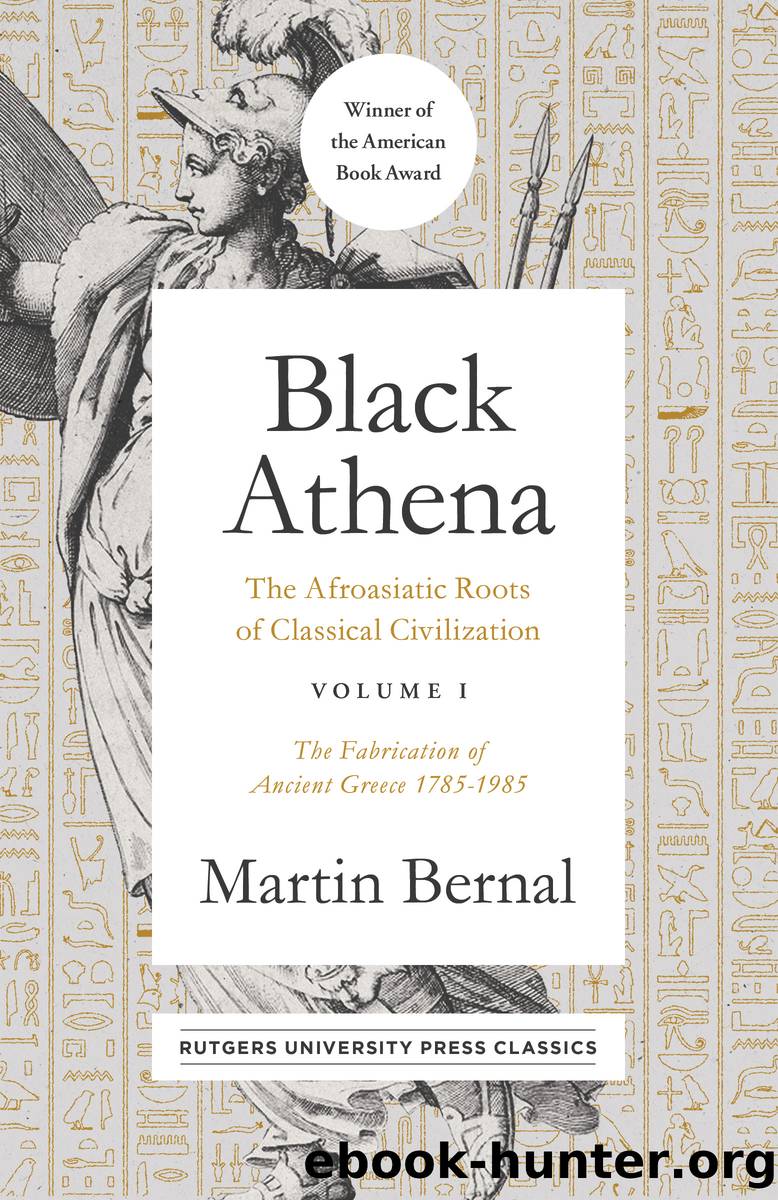Black Athena by Martin Bernal

Author:Martin Bernal
Language: eng
Format: epub
Publisher: Rutgers University Press
Humboldtâs Educational Reforms
Objectively, whatever their subjective political positions, Humboldt and Schiller helped defend the status quo. It was precisely to this kind of safe radical that the Prussian monarchy turned after the humiliation of the traditional government and its beloved army after their catastrophic defeat by Napoleon at Jena in 1806. In 1809, among other reforms undertaken to face the French Revolutionary challenge, Humboldt was entrusted with the reorganization of the educational system. He based the new structure on Bildung, which he believed would reanimate the German people after their crushing defeats. In higher education he consciously rejected the French Polytechniques, with their emphasis on mathematics and natural science, in favour of schools teaching the much broader concept of Wissenschaft. Ostensibly the new Prussian curriculum was to contain the three disciplines of mathematics, history and languages. Humboldtâs priorities, however, can be seen from the fact that no mathematics was taught for the first five years at his chief creation, the new university at Berlin.15
The leading scholar Humboldt recruited to Berlin was Wolf, who, as we have seen, introduced the Seminar, which spread from there to Prussia, then to Germany and then beyond. This system, with its insistence that students learn actively through their own research, would seem to give the students far more freedom and scope for originality than do traditional lectures. Over the past 180 years, however, while the form has produced great scholarly achievements, it is apparent that it can be and is used as a very effective tool to control both the choice and the treatment of topics of academic concern.
Wolfâs practice of Altertumswissenschaft followed that of Heyne and the Göttingen school. He rejected what he saw as the conceptualizing and abstract search for universals of the Enlightenment, in favour of direct confrontation with particulars and detailed source criticism. Completely oblivious to what can be seen, with hindsight, as his own intense Romanticism, he was able to write: âAll our research is historical and critical not of things to be hoped for but for facts. Arts should be loved but history revered.â16
This simple-minded approach has dominated the practice of most history and Classics ever since. Humboldt, at least by the end of his life, was far more sensitive. In his essay âThe task of a historianâ, he recognized that comprehension of the past required far more than external description. What was needed was a balance between ârational observationâ (beobachtender Verstand) and âpoetic imaginationâ (dichtende Einbildungskraft). The historian, however, unlike the poet, must subordinate his imagination to the investigation of reality, and âmust of necessity yield to the power of form, while keeping constantly in mind the ideas which are its laws.â17 In the 19th century these ideas certainly included the âscientific laws of raceâ.
Humboldt also tried to wrestle with the difficulties of the relationship between subject and object in historical enquiry, which he believed required some feelings of kinship such as those existing between Germany and Ancient Greece. It was thus possible to write a history of Antiquity.
Download
This site does not store any files on its server. We only index and link to content provided by other sites. Please contact the content providers to delete copyright contents if any and email us, we'll remove relevant links or contents immediately.
| Archaeology | Essays |
| Historical Geography | Historical Maps |
| Historiography | Reference |
| Study & Teaching |
Underground: A Human History of the Worlds Beneath Our Feet by Will Hunt(12073)
Sapiens by Yuval Noah Harari(5346)
Navigation and Map Reading by K Andrew(5142)
The Sympathizer by Viet Thanh Nguyen(4371)
Barron's AP Biology by Goldberg M.S. Deborah T(4132)
5 Steps to a 5 AP U.S. History, 2010-2011 Edition (5 Steps to a 5 on the Advanced Placement Examinations Series) by Armstrong Stephen(3714)
Three Women by Lisa Taddeo(3411)
Water by Ian Miller(3166)
The Comedians: Drunks, Thieves, Scoundrels, and the History of American Comedy by Nesteroff Kliph(3061)
Drugs Unlimited by Mike Power(2580)
A Short History of Drunkenness by Forsyth Mark(2274)
DarkMarket by Misha Glenny(2200)
The House of Government by Slezkine Yuri(2188)
And the Band Played On by Randy Shilts(2179)
The Library Book by Susan Orlean(2061)
Revived (Cat Patrick) by Cat Patrick(1982)
The Woman Who Smashed Codes by Jason Fagone(1954)
The Absolutely True Diary of a Part-Time Indian by Sherman Alexie(1898)
Birth by Tina Cassidy(1898)
